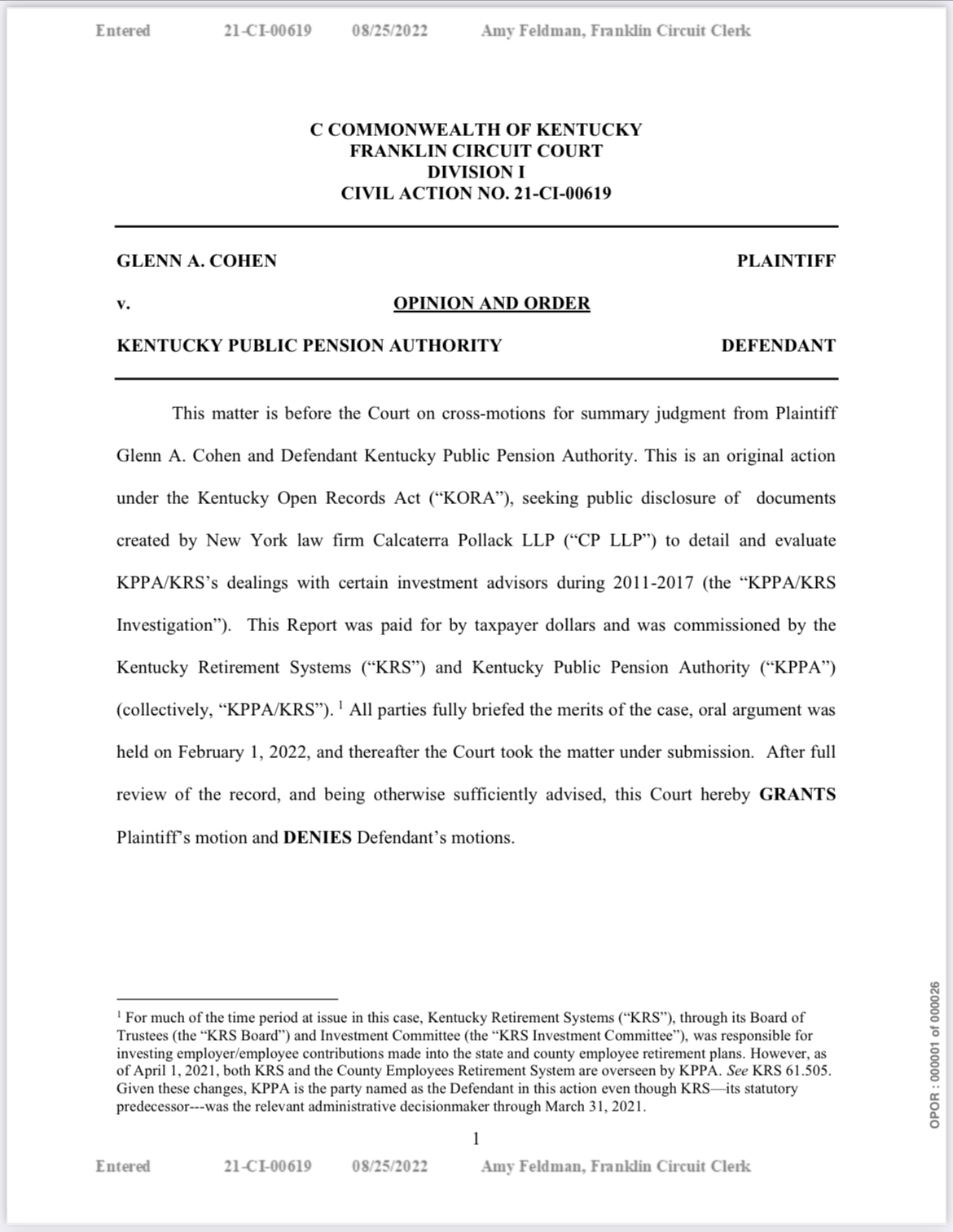
A Franklin Circuit Court’s ruling in Glenn Cohen v Kentucky Public Pension Authority is the critical first step on what will likely be a long path to shining the light of public scrutiny on the darkly secretive Kentucky Public Pension Authority (KPPA).
https://www.kentucky.com/news/politics-government/article264923629.html
In Cohen, Judge Phillip Shepherd pierces the bureaucratic veil, rejecting KPPA’s invocation of the attorney-client privilege and work product doctrine to avoid disclosure of an investigative report prepared by New York law firm Calcaterra Pollack, LLP — under a contract with KPPA — conducted at taxpayers’ considerable expense.
“The public paid $1.2 million for this report. The public has a right to know its contents and decide if it got what it paid for,” Shepherd ruled in an August 25 opinion in which he directed KPPA to make the report “available to [Cohen] and the public within 10 days of the entry of this Order.”
Against the backdrop of Mayberry, v KKR — a lawsuit alleging breach of trust and fiduciary duty filed in December 2017 by public employees who are members of the Kentucky Retirement Systems against former hedge fund managers, advisors, and KRS trustees and officers — KPPA contracted with Calcaterra Pollack to conduct the investigation in late 2020.
The investigation and report ostensibly focused on “specific investment activities conducted by the Kentucky Retirement Systems to determine if there are any improper or illegal activities on the part of the parties involved.”
Calcaterra Pollack delivered the final report to KPPA in May 2021. KPPA thereafter voluntarily shared a copy of the report with the Kentucky Attorney General who had recently intervened in the Mayberry case.
Neither the public nor the defendants in the underlying legal action — including Cohen’s client — were afforded the same access.
KPPA blithely shared the report with the attorney general but consistently denied open records requests submitted by the Courier Journal, the Lexington Herald-Leader, Kentucky Government Retirees — a labor organization with 15,500 supporters that advocates on pension issues for retired public employees — the Kentucky Open Government Coalition, and, of course, Louisville attorneys representing defendants.
KPPA characterized Calcaterra Pollack as its “legal representative” and invoked the attorney-client privilege and work product doctrine in support of these denials. The Attorney General also denied open records requests for the report.
Rejecting KPPA’s invocation of the attorney-client privilege and work product doctrine, Shepherd unequivocally endorsed the public’s right to know, simultaneously exposing the pernicious public agency practice aimed at evading public accountability by outsourcing investigations to private law firms for the purpose of erecting permanent barriers to public inspection based on specious privilege claims.
Shepherd reasoned:
“Neither the attorney-client privilege nor work product doctrine protects a mere factual record. Moreover, a compilation of facts cannot be ‘funnel[ed]’ through attorneys in order to ‘confer privilege on otherwise unprivileged records.’
“Simply put, KPPA can neither shield mere facts from disclosure nor convert them into materials that can be shielded from disclosure by engaging a law firm, at significant taxpayer expense, to gather and summarize such facts.”
Shepherd went on to clarify that — notwithstanding KPPA’s claims to the contrary — he did not order disclosure of the report to the attorney general and that KPPA voluntarily did so, thereby waiving any legitimate claim of attorney-client privilege and invocation of the work product doctrine.
Alarmingly, albeit not surprisingly, Shepherd expressed concern about a “reluctance to ‘pursue unfavorable information or legal theories’ [that] may have influenced the KPPA/KRS Investigation.”
“Indeed, in reviewing the KPPA Investigation, the Court could see areas in which the report fell short of the comprehensive analysis of ‘improper or illegal activities’ purportedly sought under the contract.
“A full review of the Report gives rise to questions as to whether the purpose and intent of the Report was to fully expose all the relevant facts (and to determine if the KPPA and its employees made mistakes), or if the Report was commissioned to cover up or minimize those mistakes in an effort to convince the OAG to not pursue claims that could prove embarrassing to the current or former management of KPPA.”
Placing his trust in the public to form its own informed opinion, Shepherd summarized (in words that bear repeating):
“The public paid $1.2 million dollars for this Report. The public has a right to know its contents and decide if it got what it paid for. The Open Records Act requires strict construction of any exceptions to public disclosure ‘even though such examination may cause inconvenience or embarrassment to public officials or others.’”


